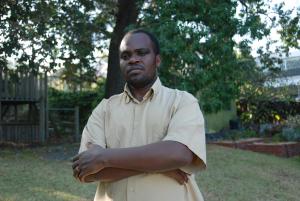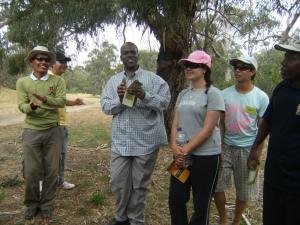Download this article in PDF here >>
At 34, Emmanuel Aliba Kiiza became the youngest ever Prime Minister of Eastern Africa’s oldest kingdom. Mike Lowe meets him in Australia.
 The first thing that strikes you about Emmanuel Aliba Kiiza is the broad good-humoured smile and the infectious laugh. Perhaps it is the laugh of someone who counts his blessings, for despite humble beginnings he became, at 34 years old, the youngest ever Prime Minister of the Kingdom of Bunyoro-Kitara in Uganda.
The first thing that strikes you about Emmanuel Aliba Kiiza is the broad good-humoured smile and the infectious laugh. Perhaps it is the laugh of someone who counts his blessings, for despite humble beginnings he became, at 34 years old, the youngest ever Prime Minister of the Kingdom of Bunyoro-Kitara in Uganda.
We meet in Melbourne, where Kiiza is participating in the Life Matters course, run by Initiatives of Change, Australia. He joins a diverse group of 18 other participants, mostly in their 20s, who live in community for nine days learning from each other and from a variety of experienced ‘change-makers’ in the city. Questions are asked which encourage deep inner reflection about one’s own values and how well they are lived. Connections are made between the inner journey and the needs of the world. Safe spaces are created in which participants share their unique life-stories.
And so we learn that Kiiza never knew his father, who was killed before he was born. One of eight brothers and five sisters, Kiiza was the brightest in his class. But his education nearly ended at age nine when his struggling mother could not afford to pay school fees. Fortunately, a kindly teacher offered to pay them himself. When this teacher was transferred to another village Kiiza followed him, walking five miles to and from school every day. He continued to excel, but secondary school posed new financial challenges and as a result his first term was spent at home.
This time it was a Catholic priest, Fr Deogratias Zziwa, who offered to pay for his education. With Fr Zziwa’s encouragement, Kiiza also began to study for the priesthood before realizing that his vocation lay elsewhere – in education. With financial help from his bishop, he went on to complete masters and post-graduate degrees in education from Makarere University, Uganda.
For the next two years Kiiza found employment teaching professional studies to teachers in Namasagali University in Eastern Uganda. To this day, he says, he is happiest in a lecture theatre in front of a class. He rose to become head of the distance education programme, as well as head of the School of Education. With a wife and steady income, it must have been a wrench to leave this when his bishop asked him to return to his homeland, to help His Majesty King Agutamba Solomon Gafabusa Iguru the First set up the new Bunyoro University for Development.
With a tradition stretching back over 4,000 years, Bunyoro-Kitara is the oldest kingdom in Eastern Africa. At its height it controlled almost the entire region between Lake Victoria, Lake Edward, and Lake Albert. One of four kingdoms which make up present-day Uganda, Bunyoro-Kitara paid dearly for its resistance to colonialism. From 1890–1899 the British conducted a scorched-earth campaign which left as much as 75% of the population either dead or living outside the kingdom. The king was captured and exiled to Seychelles and traditional Bunyoro lands were given to neighbouring, rival kingdoms. In the subsequent development of colonial Uganda, Bunyoro-Kitara was punished, while its rival kingdom, Buganda, (which had sided with the British) was favoured.
‘When the bishop asked, I could not refuse,’ says Kiiza, ‘even though the job was unpaid.’ However his efforts did not go unnoticed. A year later the King asked him to serve as Speaker of the 150-member Council of the Kingdom. A year after that, to his great surprise, he was appointed Prime Minister. After nine days of prayer, contemplation and consultation, he accepted, and was sworn in as 11th Prime Minister of the Kingdom on 2 December 2006.
In office, Kiiza threw himself into the preservation of Bunyoro-Kitara’s rich cultural heritage, in order to give its people a sense of belonging and pride. In 1967 Ugandan President Milton Obote abolished the kingdoms – perhaps fearing a rival source of authority. They were only restored in 1994. Kiiza has helped revive the traditional clan system; the Palace and two Royal Tombs have been restored; and the nine-day coronation anniversary, held each year in the Capital, Hoima, is now the largest cultural event in Uganda. He also persuaded the Ugandan Government to recognize the Omukama Kabalega (the Bunyoro King who fought the British) as a Hero of Uganda. This was marked in a ceremony on 9 June 2009 when President Yoweri Museveni laid a wreath on Kabalega’s tomb outside Hoima and a three-gun salute was sounded.
He is no less passionate about education, helping raise money through the Kabalega Education Fund to offer scholarships to bright students from poor families.
In 2006, while serving as Speaker, Kiiza found himself asked to represent the King in talks with Joseph Kony, head of the Lord’s Resistance Army (LRA). ‘Because of kinship links between Kony’s chiefdom and Bunyoro-Kitara, Kony asked the King to help,’ he explains, ‘so the King sent me’.
He went with some trepidation, knowing the LRA’s reputation for brutality and its use of child-soldiers in the 20-year conflict with the Ugandan Army. With other mediators he walked, unarmed, for several days deep into LRA territory, not knowing if they would survive. ‘Some of those who went with us were Kony’s enemies whom he had sworn to kill. But when the King speaks I have to obey. There is no way to refuse!’ Kiiza carried a message from the King that Kony should ‘turn his gun upside down’ and join peace talks with the Ugandan Government. Fortunately the delegation was received well. Kony did agree to a cease-fire and peace negotiations started. Kiiza went several more times to meet Kony before negotiations broke down and the tragic conflict resumed.
The colonial legacy of ‘divide and rule’ has left its mark all over Africa in terms of enduring tribal and regional conflicts. ‘In Uganda we are trying to unite all the cultural institutions to live together,’ says Kiiza. In November last year he called the first ever meeting of all cultural leaders, kings, chiefs, paramount chiefs, ‘to reconcile among ourselves’. He was pleased that ‘all of them came and the King of Buganda sent the head prince!’
 During the Life Matters course, and after visits to IofC conferences in Caux, Switzerland, Kiiza was particularly struck by discussions on forgiveness and its role in overcoming the wounds of the past. He returned home with a conviction that the bitterness which still remains from the time of colonial oppression is holding the Bunyoro people back. He is convinced that unconditional forgiveness is possible and that only this will heal the wounded memories. It is a controversial issue. Many blame (with justification) what the British did for continued poverty and illiteracy in the kingdom.
During the Life Matters course, and after visits to IofC conferences in Caux, Switzerland, Kiiza was particularly struck by discussions on forgiveness and its role in overcoming the wounds of the past. He returned home with a conviction that the bitterness which still remains from the time of colonial oppression is holding the Bunyoro people back. He is convinced that unconditional forgiveness is possible and that only this will heal the wounded memories. It is a controversial issue. Many blame (with justification) what the British did for continued poverty and illiteracy in the kingdom.
No longer Prime Minister, Kiiza is undeterred. In May, Bunyoro-Kitara hosted an inter-cultural dialogue with the European Union. Kiiza was invited by the Resident District Commissioner (representing the President of Uganda) to write her speech for the occasion, which called for a new relationship based on forgiveness. Weeks later he helped defuse the anger of Bunyoro who were dispossessed of lands during the colonial period, by advising the President, through the Inspector General of Police, to meet the aggrieved people and engage in dialogue. As a result a planned demonstration was called off.
In conversations with university students one girl observed that, ‘the one who has buried their mother does not remain sleeping in the graveyard, weeping. However much one loves the mother, one must let go and learn new skills of living without the mother!’ The Bunyoro, she said, ‘buried their dear ones also but remained in the graveyard, weeping up till today.’
Kiiza is encouraged. ‘Even Rome started with the first brick,’ he says. ‘It was small but it grew into a big city.’


